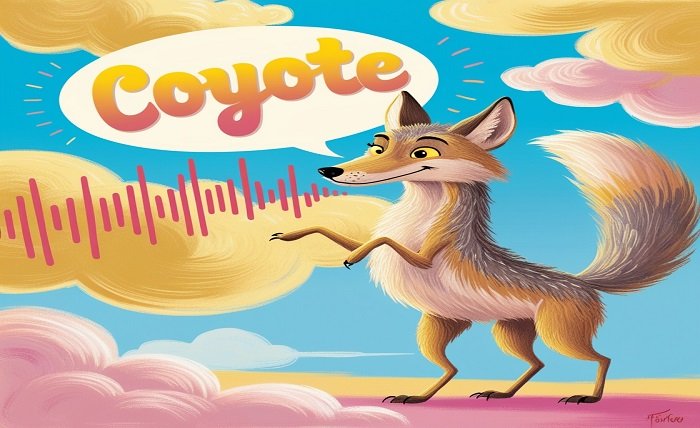Pronunciation disputes regarding the word “coyote” are common, especially within various geographical and cultural contexts. This word, although seems straightforward, may spark an interesting conversation about language, culture, and the amazing creature it describes. We’ll discuss regional variances, the etymology of coyote pronunciation, and how these variations reflect larger cultural settings in this blog post.
Introduction
Coyotes are recognizable species in North America, valued for their ability to adapt and their sly demeanor. However, we need to address one important issue before delving into their intriguing characteristics: how do we coyote pronunciation? Pronunciation can be confusing, with variations ranging from “kai-oh-tee” to “ki-oh-tee”. This article will analyze the term’s etymology, look at how it should be pronounced differently, and explain the cultural importance of these variations.
The Etymology of Coyote
The term coyote originates from the Nahuatl word coyote, used by the Aztecs and other indigenous people of Mexico. This etymological background is crucial for understanding how the word has evolved and how its coyote pronunciation can vary based on linguistic roots and cultural influences. By recognizing its indigenous origins, we not only appreciate the word itself but also the cultural richness associated with it, highlighting the connection between language and identity.
Typical Pronunciations
“Kai-oh-tee” is one of the most popular sounds in the United States. This coyote pronunciation is quite near to the original Nahuatl pronunciation, which is why those who are aware of the word’s indigenous origins prefer it. It sounds poetic because of the way the syllables are pronounced, which highlights them clearly. A common reason for choosing this pronunciation is respect for the word’s origins and the civilizations that have influenced its meaning.
In Popular Culture, Coyotes
Coyotes, who are frequently described as cunning or mischievous, have appeared in a variety of literary, television, and cinematic works. In certain situations, a character’s coyote pronunciation of a word can occasionally reveal something about their personality or cultural upbringing. In addition to influencing how the general public views coyotes, this portrayal also affects how viewers interact with the animal and its symbolic meaning in stories.
The Significance of Pronunciation in Culture
coyote pronunciation has a big cultural impact on a lot of Native American tribes. It is possible to show respect for indigenous peoples’ languages and customs by pronouncing words correctly. This knowledge strengthens the significance of acknowledging and respecting indigenous history in language use by fostering a greater grasp of the cultural context surrounding the phrase.
The Consequences of Mispronunciation
Typical Errors
coyote pronunciation incorrectly might cause confusion or even embarrassment. People frequently mispronounce words or mix up their stresses, especially if they are not familiar with the word’s history. Errors like these can ruin discussions about biodiversity and cultural significance, which emphasizes the importance of being more mindful of linguistic nuances.
The Value of Consciousness
A greater appreciation of the various cultures associated with a term and improved communication might result from knowing the subtleties of pronunciation. It makes it possible to have more in-depth discussions on conservation and wildlife, and it encourages speakers to consider the meanings they choose to communicate in various contexts.
Coyote Behavior and Ecology
Flexibility
coyote pronunciation are renowned for their exceptional environmental adaptation, which is demonstrated by the variety of habitats they inhabit, which range from urban areas to rural landscapes. Because of their versatility, they have been able to flourish in a wide range of environments, which has made them a fascinating topic for wildlife ecological research. Comprehending their conduct in many environments can offer discernment into their function in ecosystems and their engagement with human beings.
Social Organization
The complex social behaviors that coyote pronunciation frequently display, such as pack dynamics, are a reflection of their intellect and adaptability. Their social structure is very different, with some people living better alone while others do better in groups. Their ability to deal with a variety of environmental problems is demonstrated by their diverse social behavior, which is an important part of their survival strategy.
Preservation and Human Communication
Wildlife-Human Conflict
Conflict can arise from coyote pronunciation with people as they become more and more common in urban settings. In order to promote cooperation, it is essential to comprehend their behavior, since myths about coyotes can fuel animosity and fear. Public awareness of coyotes’ ecological responsibilities can lessen tensions and encourage happy coexistence between people and wildlife.
Conclusion
Knowing how to coyote pronunciation reflects our respect for the natural world, our regional identities, and our cultural ties. It goes beyond simple phonetics. Our pronunciations and perceptions of words that have deep personal significance change along with language. Regardless of your preference for “kai-oh-tee” or “ki-oh-tee,” the important thing is to recognize the rich cultural and historical background that surrounds this amazing animal.
FAQ
How should the word coyote pronunciation?
Though there are other ways to coyote pronunciation it, “kai-oh-tee” and “ki-oh-tee” are the most widely used. Both are generally acknowledged.
Why is the word coyote pronunciation differently?
The change in language is due to words from regional languages and Nahuatl origin. Read more about: disney lorcana wallpaper
In a conversation, how should I coyote pronunciation correctly?
It is acceptable to use “kai-oh-tee” or “ki-oh-tee,” but respect cultural origins by considering the audience and context.
Does the pronunciation of “coyote” matter?
Although it’s not required, pronouncing words correctly can improve dialogue about animals and promote respect for indigenous cultures.
How can I get more information on coyotes?
To find out more about coyotes and their ecological relevance, check out online resources, local nature reserves, and wildlife organizations.

